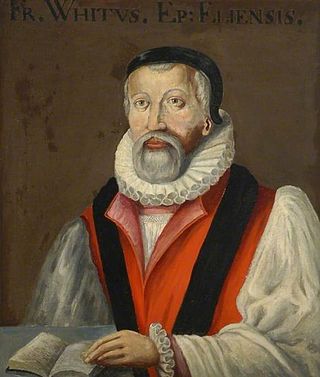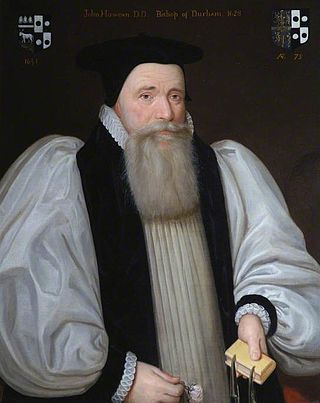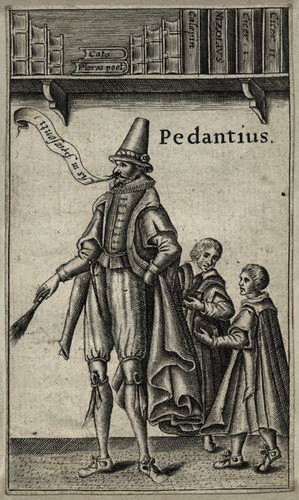Related Research Articles

Richard Neile was an English churchman, bishop successively of six English dioceses, more than any other man, including the Archdiocese of York from 1631 until his death. He was involved in the last burning at the stake for heresy in England, that of the Arian Edward Wightman in 1612.

Thomas Morton was an English churchman, bishop of several dioceses. Well-connected and in favour with James I, he was also a significant polemical writer against Roman Catholic views. He rose to become Bishop of Durham, but despite a record of sympathetic treatment of Puritans as a diocesan, and underlying Calvinist beliefs shown in the Gagg controversy, his royalism saw him descend into poverty under the Commonwealth.

Francis White was an English bishop and controversialist.
Richard Montagu was an English cleric and prelate.
John Scory was an English Dominican friar who later became a bishop in the Church of England.

Matthew Wren was an influential English clergyman, bishop and scholar.

John Overall (1559–1619) was the 38th bishop of the see of Norwich from 1618 until his death one year later. He had previously served as Bishop of Coventry and Lichfield, as Dean of St Paul's Cathedral from 1601, as Master of Catharine Hall from 1598, and as Regius Professor of Divinity at Cambridge University from 1596. He also served on the Court of High Commission and as a Translator of the King James Version of the Bible.

Robert Abbot was an Anglican bishop, academic and polemical writer. He served as Master of Balliol College, Oxford, Regius Professor of Divinity, and Bishop of Salisbury from 1615. Among his four younger brothers, George became Archbishop of Canterbury and Maurice became Lord Mayor of London.

John Howson was an English academic and bishop.
Thomas Jackson was an English theologian, and President of Corpus Christi College, Oxford. Originally a Calvinist, he became in later life an Arminian.
Benjamin Carier (1566–1614) was an English clergyman, a fellow of Chelsea College who was a well-publicised convert to Catholicism.

Thomas Beard was an English clergyman and theologian, of Puritan views. He is known as the author of The Theatre of Gods Judgements, and the schoolmaster of Oliver Cromwell at Huntingdon.
Thomas Laurence (1598–1657) was an English churchman and academic, Lady Margaret Professor of Divinity and expelled Master of Balliol College, Oxford.

Robert Grove (1634–1696) was an English Bishop of Chichester.
Francis Dee was an English churchman and Bishop of Peterborough from 1634.
Eleazar Duncon was an English Royalist divine.

Arminianism was a controversial theological position within the Church of England particularly evident in the second quarter of the 17th century. A key element was the rejection of predestination. The Puritans fought against Arminianism, and King James I of England opposed it before, during, and after the Synod of Dort, 1618–1619, where the English delegates participated in formulating the Calvinist Canons of Dort, but his son Charles I, favoured it, leading to deep political battles. The Methodists, who espoused a variant of the school of thought called Wesleyan–Arminian theology, branched off the Church of England in the 18th century.
John Gregory, a.k.a. John Gregorie, was an English orientalist.

William Laud was a bishop in the Church of England. Appointed Archbishop of Canterbury by Charles I in 1633, Laud was a key advocate of Charles I's religious reforms; he was arrested by Parliament in 1640 and executed towards the end of the First English Civil War in January 1645.
The Little Gidding community was an extended family and religious group based at Little Gidding, Huntingdonshire, England, in existence from the middle of the 1620s to the later 1650s. It gained attention in its time because of the interest Charles I of England showed in it. In the 19th century associated buildings were restored; T. S. Eliot was attracted to it as an examplar of religious life in the Church of England, and subsequently made it prominent by his poem Little Gidding, one of the Four Quartets.
References
- ↑ http://www.trin.cam.ac.uk/rws1001/preprints/thomasfarnaby.pdf Archived 6 June 2011 at the Wayback Machine , at p. 11.
- ↑ Appendix — Little Gidding | A History of the County of Huntingdon: Volume 1 (pp. 399–406)
- 1 2 3 4 5 . Dictionary of National Biography . London: Smith, Elder & Co. 1885–1900.
- ↑ William Dunn Macray, Annals of The Bodleian Library, Oxford, pp. 69–72.
- ↑ Anthony Milton, Catholic and Reformed: The Roman and Protestant Churches in English Protestant Thought, 1600–1640 (2002), p. 250.
- ↑ Milton, p. 120, note p. 123.
- ↑ Kenneth Fincham, Nicholas Tyacke, Altars Restored: The Changing Face of English Religious Worship, 1547–c. 1700 (2007), pp. 137–9.